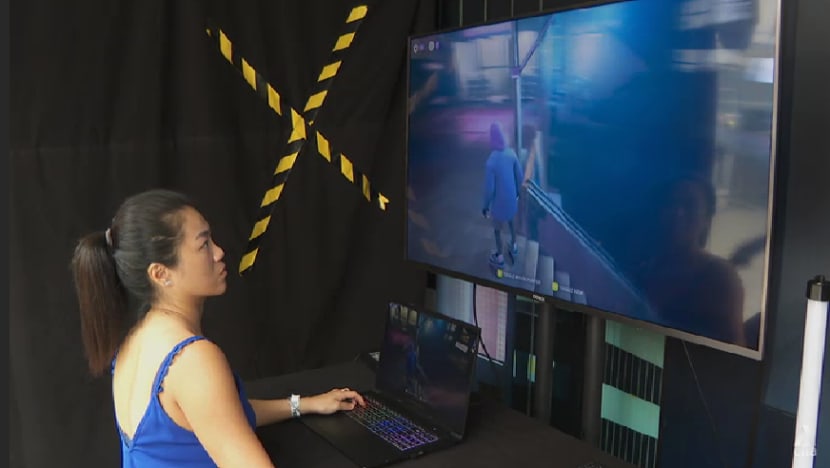Metaverse scene in Singapore heats up, but firms struggle to find talent
Industries and brands are increasingly turning to the metaverse to straddle the digital and physical worlds, build their brands and reach out to more clients.

A user plays a game on a metaverse platform.
SINGAPORE: More firms are looking to integrate the metaverse into their products and services, say industry players.
They are harnessing engagement games and social activities in these virtual playgrounds to build their brands and reach out to more clients.
There is also a new buzzword: phygital – combining physical and digital experiences for customers.
“To us, the metaverse is already here, it’s not 5 years or 10 years away,” said Mr Warren Woon, co-founder of local metaverse platform Xctuality.
The metaverse is simply a new medium of consumption, Mr Woon explained, adding that companies are gradually learning to tap the space to create more immersive experiences for customers.
“The vision here is bigger than just the metaverse. Our vision is a smart city. So the metaverse is not just a way to play games or experience gamification. It is a way to cross worlds, from virtual to physical and vice versa,” he said.
VENDING MACHINES BRIDGE THE WORLDS
One challenge is to get more Web2 users – anyone who uses the current state of the internet including social media, to hop onto Web3 – the next evolution of the internet which incorporates concepts such as decentralisation and blockchain technology, and is used to access the metaverse.
“Sometimes when we don’t see it or touch it then you cannot relate. But once we have these solutions out in the open, then people start figuring out what to do,” Mr Woon said.
One such initiative the company is using to straddle the virtual and physical worlds is vending machines.
Metaverse users would earn digital coins while playing games. They can then use those tokens to redeem merchandise, which could be collected in the physical world via these vending machines.
Industries and brands can apply this concept to their existing products and services, said Mr Woon, giving an example of how this could work in tourism.
For instance, tourists could do a pre-arrival in the digital space, ahead of reaching a physical destination.
They would be able to explore tourist sites, play engagement games offered by the venue's attractions, and win prizes, which could come in forms of discounts or souvenirs, all before arrival.
Upon landing, visitors could be directed to pick up their prizes at the sites, which would drive footfall to attractions and venues.
In addition, they could be redirected back into the metaverse through the physical venue by earning points or getting additional rebates that could benefit them in the virtual space.
In healthcare, smart technology could be used to track a user’s health and eating habits, Mr Woon said. Grocery shopping could be a curated experience with artificial intelligence (AI) suggesting items based on consumption patterns and health needs, he added.
"MAKE FARMING SEXY" FOR YOUTH
Another physical-digital venture is Xctuality’s gamification of the agriculture industry. The firm set up Metafarms, a Web3 phygital farm in the Philippines which involves gamers in the virtual space and farmers in the fields.
“We connect physical farms – the farmers, the operations, the lifestock and the cash crops, with the metaverse and gamification side of it. So kind of think of it like FarmVille, but connected to real farms,” he said, referring to the popular video and mobile game where users farm and harvest crops.
In Xctuality’s phygital reality, users play a farming game in the metaverse, and part of the earnings go directly to the farmers, who can use the cash to buy more crops and equipment to generate more income. A part of the revenue then goes back into the game.
Mr Woon said it is a win-win situation for the players and the farmers, in both the digital and physical realms.
“There are real tangible benefits behind playing this game and the farmers benefit as well. We are trying to help the farmers – the small guys – because a lot of times they are 'unbankable', especially across Southeast Asia,” he said.
“On the other hand, the younger demographics don’t find farming fun, so we want to make farming fun and sexy,” he added.
This fluid interaction and immersive experience between the virtual and physical world is a huge selling point for the metaverse, as it is something that Web2 technologies such as apps are not able to provide, he noted.
“So the targeting is more focused and the likelihood of conversion is much higher. So these are ways of reimagining how the metaverse can be combined with other elements to bring a very different sort of experience,” Mr Woon said.
SINGAPORE AS A METAVERSE HUB
Industry players said the Web3 ecosystem is picking up and Singapore is seen as an attractive location for companies to set up shop to create non-fungible tokens (NFTs) and metaverses.
“A lot of companies from all over the world, including China and Europe, are starting their operations in Singapore and I think there will be a lot of opportunities,” said Mr Shawn Lim, founder of The AceMeta Company.
The homegrown firm is focusing on building a digital community of like-minded artists to interact and co-create on their metaverse, and allows its users to decide and vote on desired games and functions on the platform.
“At the moment, I think a lot of NFT projects are not very focused on metaverse. We want to provide (users) with NFTs and not just focus on art, we also want to focus on the whole immersive experience we can get coming to the metaverse,” said Mr Lim.
Mr Woon said Singapore’s regulatory aspects and a stable environment are huge draws for businesses, along with support given by the government for enterprises.
“It is very easy to set up a business in Singapore and to operate. And Singapore has a good reputation of being a finance hub, and also a tech hub,” he added.
WEB3 SECTOR LACKS LOCAL TALENT
But even as companies see growing interest and traction from the public, hurdles remain.
Firms said the biggest barrier for the industry at the moment is a lack of local talent with the relevant skills to build the metaverses.
“The biggest hurdle is the number of talents that we can find that have the proper skill set to really build what we need,” Mr Woon said.
“We require our tech staff to have at least two domain knowledge in areas that a lot of schools don't teach. So how do we then build such a team?” he asked.
His company currently has a lean team of 32 staff members working remotely across eight countries.
The recent crypto crash also does not bode well for the phygital future, as digital cryptocurrencies are typically used to buy and sell items in the metaverse.
Some firms are expanding to accept fiat currency payments in hopes that it will boost metaverse adoption in the future.
As technology advances, industry players expect more talent to emerge and the metaverse to get increasingly popular, with both businesses and users.
“For the metaverse to really take shape, and for the technology to be more mature, maybe another 5 to 10 years. But it will be good for us (Singapore) to get into the industry now,” said Mr Lim.



















